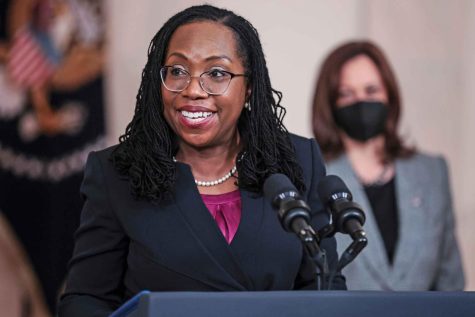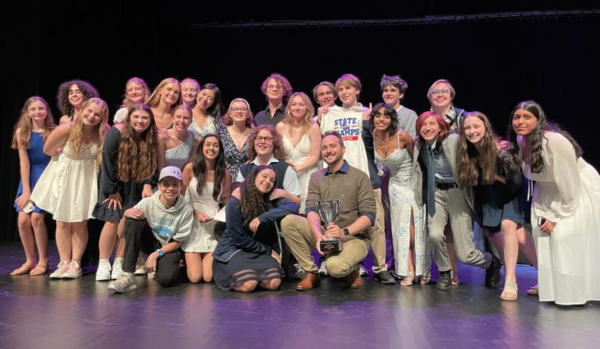What the Nomination of Ketanji Brown Jackson Means for Women of Color
Rachanreddy (standing up) and Alvarado (sitting down) pose for a photo in the mock courtroom.
March 10, 2022
If confirmed by the U.S. Senate, Ketanji Brown Jackson, a judge on the United States Court of Appeals, will be the first Black woman to be a Supreme Court Justice.
This profound moment in history has inspired women and girls of color across the nation.
Sophomore Shridha Rachanreddy, who is of Indian descent, is in her second year of the law and justice pathway. She said Jackson, who on Feb. 25 became the first Black woman nominated for the high court, serves as a role model for her.
“I find it really inspiring and motivating that something like that’s happening while I’m living,” Rachanreddy said, adding that “In the past, it used to be all white, middle-aged men, and I’m just really glad to see more diversity.”
Even though Brown v. Board of Education sided in favor of integration, for example, she feels that the actual implementation of the ruling would have been more successful had there been people of color on the court. In addition, Rachanreddy said she wants to see equal pay for women.
Sophomore Jacky Alvarado, who is of Mexican descent, is also taking a law and justice elective, said cases of reproductive rights for women would have gone more smoothly if more women had been on the court.
“I love the representation. After RBG passed away, I think there needed to be more women,” she said, referring to the late Supreme Court Justice Ruth Bader Ginsberg.
There are currently three women serving on the court. The only woman of color, Sonia Sotomayor, has been an associate justice since 2009.

Speaking of Jackson, Alvarado said, “I think she’ll do a really good job at bringing more perspective because I feel like she had different experience getting to where she is than other people.”
Sophomore Kennedy Taylor said she hopes Jackson’s nomination will be accompanied by more Black women in higher positions.
“I think she’s showing a very good example for kids now to look up to,” Taylor said.
She also said the need for women to get educated is imperative. For most of history, she said, obtaining an education has been a struggle for women, especially Black women.
According to Biography, Jackson’s visit to Harvard University for a debate competition while in high school inspired her to apply to the school. However, according to The Washington Post, her guidance counselor advised her not to aim for the Ivy League school.
Regardless, she attended Harvard Law School and was an editor for the Harvard Law Review.
Junior Alyx Humayra, who was born in Indonesia, is also passionate about involving herself in politics.
“It’s important for people to be educated — to know what important issues are — and it’s not the best idea when you’re talking about something that you don’t know about,” Humayra said.
Humayra watched President Joe Biden officially nominate Jackson to the Supreme Court and even researched her.
“She brings new things to the table, she’s worked in public defense, and she’s worked on trials and stuff, so she seems really qualified, and I think that it’s a step in the right direction for the nation,” Humayra said.
Jackson’s list of qualifications is extensive, including having written 578 court decisions, only 10 of which were reversed in her eight years on the district court, according to CBS News.
“It’s very encouraging and inspiring for women of color across the nation to not give up and continue to pursue what they want to pursue because this woman was able to do it, so they can too,” said Humayra.












unknown • Mar 10, 2022 at 4:50 pm
GET THE BILL, PURR